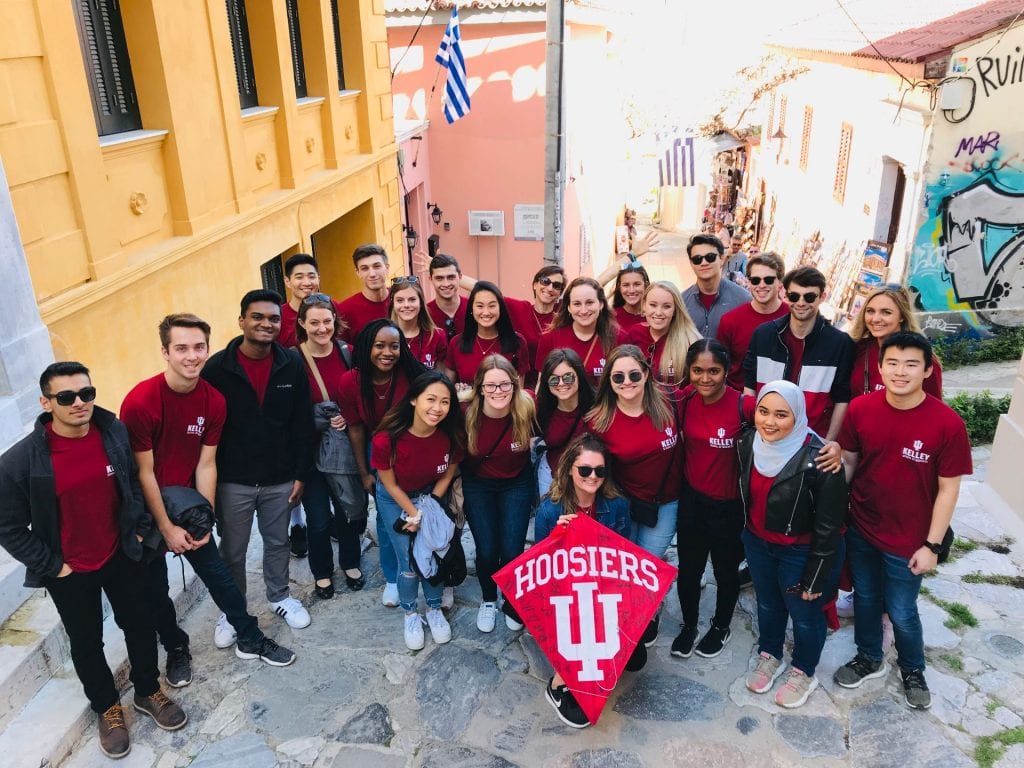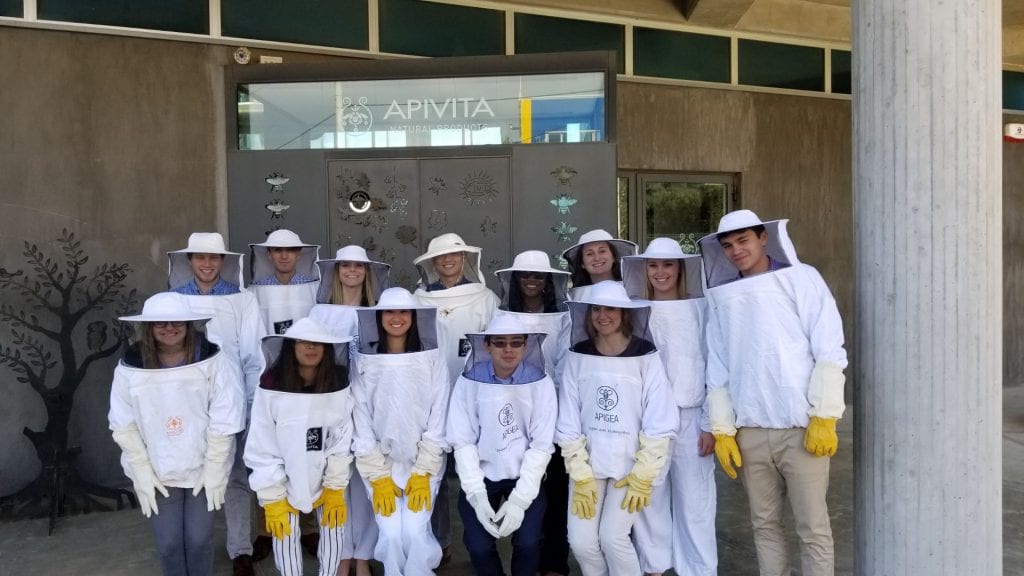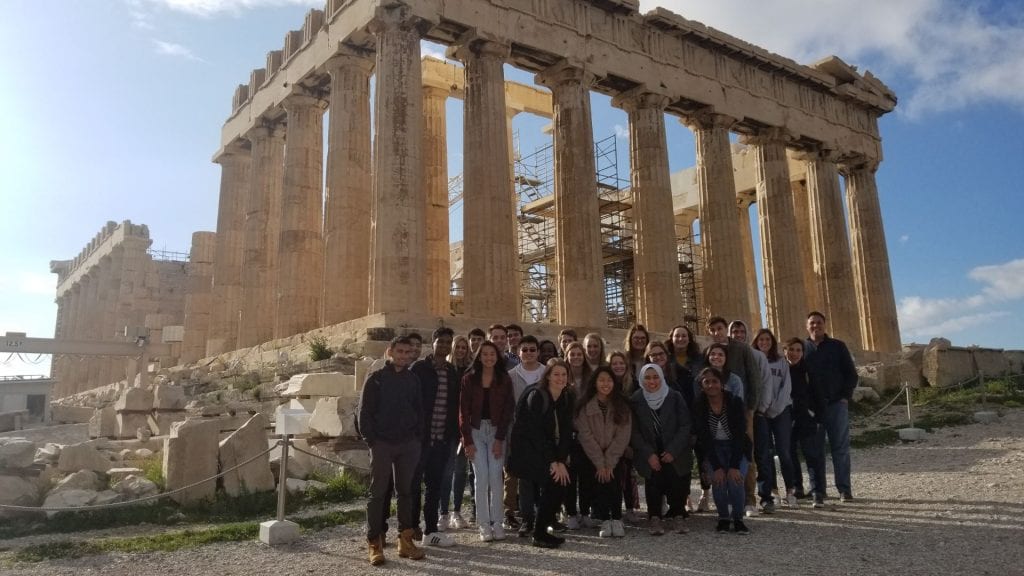
BLOOMINGTON, Ind. – Many around Indiana University, the Kelley School of Business and beyond know of Tatiana Kolovou’s love for the land of her birth, Greece.
As attested by the headline of recent article in Hellas Journal, a major Greek publication, the Kelley faculty member also is known as “the Greek professor in the U.S. who teaches her students to love our country.”
Over the last decade, Kolovou, a senior lecturer of business communication, has taken about 300 Kelley School undergraduates and MBA students to Greece as part of immersion courses about the country, its economy and culture. She and two dozen undergraduate students in her “Business Culture of Greece” class traveled there during spring break on March 10-17.
They visited companies and met with business professionals involved in a variety of industries, including the Greek offices of global advertising giant, McCann; Greece’s leading digital media communications company, Antenna Group; a natural cosmetics company, Apivita; an outdoor recreational products manufacturer, Terra Nation; an olive oil producer and tourism and travel firms.
The people they met included Anastasios Economou, founder of the investment holding company iGroup who has been called the “Mark Cuban of Greece;” and Nikos Panayiotopoulos, a member of Greece’s parliament.
A key element to the course and the students’ visits are the consulting projects they do for Greek companies. This spring, they did work for My Odyssey, a travel agency that continues to expand its reach into China and attract more visitors from there to Greece.
“Students have approached the issue globally, and indeed have helped us with their proposals that are substantial and targeted. Indeed, some of their recommendations we will follow,” company CEO and co-founder Fokion Drosos told a reporter from the Athens News Agency. “I would urge other Greek companies to join this program.”
Kolovou came to Indiana in 1984 as an “academic immigrant” to study at IU, found love, started a family and today teaches business communication at Kelley, helping her students to be more effective in working across cultures. She also consults with executives and teams at large companies to develop effective communication skills for the global enterprise.
She came up with idea during the height of Greece’s financial crisis in 2009. While discussing the situation with a Kelley School administrator at a holiday party, she reminded him that the issues in Greece reached beyond the country’s borders across Europe, which were then unfamiliar to the Kelley undergrads. Also becoming evident was Greece’s entrepreneurial culture.

The class has offered Kelley students with a unique opportunity to look closely at the economic crisis in Greece, how it caused reverberations across global financial markets and the country efforts to emerge from recession. Since then, 16 similar immersion courses have been added to the Kelley undergraduate curriculum in an effort to expand students’ global awareness.
“I wanted to change the mindset among Americans who believed that the Greeks were lazy. I wanted to do something to help others see the true face of my country,” she told a reporter. “What I seek and want every time I come back to America from Greece is for my students to say to their peers that Greece is not what they thought.”
Sydney Dixon, a Fry Scholar and sophomore honors student from the Dallas area, said Kolovou provided a unique view of Greece. “She brought in Greeks who now live and work in the U.S., people who study EU policies, and other professors to provide us with varied opinions on Greece’s status,” she said. “She enabled us to make our own educated opinions on Greek legal systems, business practices, and politics. By having a Greek professor who is so passionate about her country and pushed the entire class to study so much beforehand, the trip itself was that much more rewarding. And eating delicious baklava, souvlaki, and feta cheese everyday was almost equally incredible.
“I learned that Greeks consider their personal values in all that they do personally and professionally more so than other countries. This was vital to my understanding of Greek history and their economic crisis because I was able to better understand how Greeks think,” Dixon added. “This was a different ideology from what I was used to and I’m thankful I got to experience it. I plan to keep this in mind from now and work to have my values in the front of my mind while evaluating my career choices.”
Another student, Maggie Bedore, a sophomore from Chicago, said the class enabled her to experience the global foundations that Kelley provides its students. “Greece provided me with exponential personal and professional development. Experiencing Greece forced me to recognize the value of becoming a global businesswoman,” she said. “Greece is an optimistic land of opportunity for passionate entrepreneurs. Greeks’ individual values are prevalent in their work. If a Greek does not truly believe in a project, they see no purpose to continue.”
Of course, the trip is not all about business. Students visited historic sites such as the Acropolis, flew kites on Philopappu Hill, a traditional pre-Orthodox Easter activity (see the picture of the IU kite above). They participated in a private olive oil tasting session and traveled to the island of Aegina to learn about the world famous pistachio farms.
And the Greek media took notice. Articles about the Kelley class appeared at web sites for Greece’s version of CNN and Fortune. Kolovou was interviewed live by a top Greek network TV show. A photo of the class at an olive oil tasting class appeared in a New York Times article about the country’s economic revival.
“Influencing students’ minds at this stage of their professional life, is critical,” Kolovou said of her students. “Facilitating this exploration in the setting of my beautiful country is priceless.”
